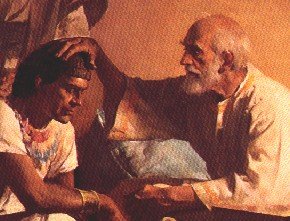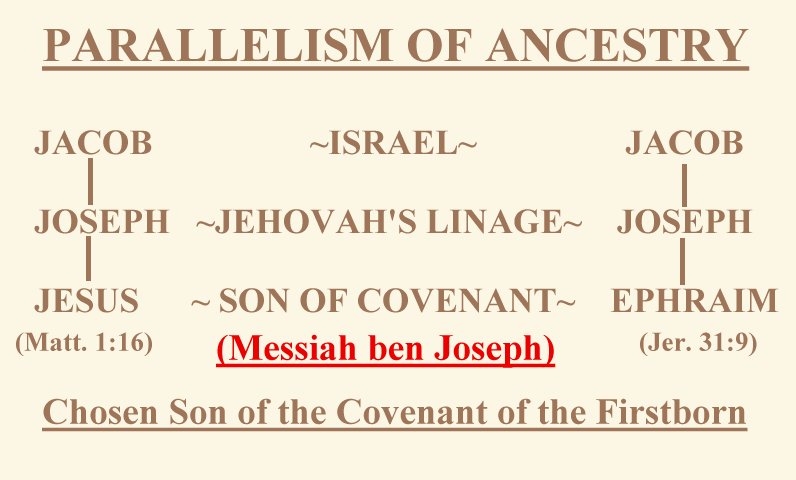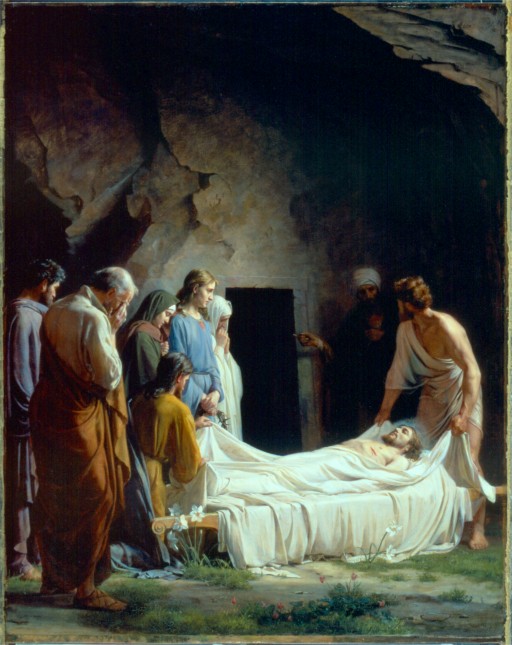88. Other Threads: Right Down to Being Buried in Joseph's Tomb
~ The Birth ~
"And Joseph also
went up from Galilee, out of
the city of Nazareth, into Judaea,
unto the city of David, which is called
Bethlehem; (because he was of the house and lineage of
David:)" ~ Luke 2:4
Now the parallel imagery here is quite remarkable. We have 'Joseph' who is a
representative parallel with Joseph of Egypt, going up from 'Galilee', which
is a land area of the Kingdom of Ephraim. And this Joseph of the kingdom of
Ephraim is in the process of becoming an adoptive parent to the firstborn son
of the womb of Mary. This parallels Mahlon of Ephraim being the adoptive
legal and rightful parent of Obed, the firstborn son of Ruth. And thus going
out of Ephraim, they are traveling to Bethlehem and not only Bethlehem, as
Micah 5:2 establishes, but to Bethlehem-Ephratah, NOT Bethlehem-Judaea. This
is the place of the burial of Rachel who according to the traditions of the
Jews, had prophesied that the Messiah would come of her son Joseph, thus
Messiah ben Joseph. Now that the city of David was Bethlehem-Ephratah or a
city of Ephraim, which seems understandable, it being that 'family plot' of
land of those of the house of Rachel, of Rachel's burial location, and they
would have property claims round about that location of that burial place of
their matriarchal parent of fame, the wife of Jacob or Israel. Thus the
picture drawn in representative parallelism is quite compelling. Joseph's son
being born at the location of Rachel's tomb, the Mother of Israel who had
predicted that birth from he son Joseph's lineage. And that they had come out
from Ephraim (Galilee) to be a part of this vicarious birthing and parenting
upon the part of that Galilian of Nazareth, Joseph. The paralleled symbolic
coincidence seems beyond happenstance. There would appear to be the shadow of
the hand of God behind it, painting it to be so, thus confirming the truth of
the symbolic representative paralles here struck. Without this symbolic
representative parallel, the whole of it is but a paradox of inconsistancies,
absurdity and contradiction, Joseph coming out of Ephraim to vicariously
father the Messiah at the site of Rachel's tomb.
~ Threads
Throughout ~

The connections between Joseph, his son Ephraim and Jesus Christ are beyond
mere happenstance. They are too frequent to be coincidental. There was
Joseph's dreams, including a third drean concerning the Messiah of Joseph,
which is still had in Jewish tradition. Jacob had chosen Joseph over his
brethren. In the scriptures this preference for the house of Joseph begins
with Jacob's blessing of Ephraim in JST Genesis 48 at his firstborn and to
have the name of Jacob, the name of Israel placed upon him and next there is
also Jacob's blessing of Joseph in Genesis 49:22-26 that stipulates Joseph to
be the source of the of the shepherd and stone or rock of Israel. Joseph was
pronouced by Rachel, according to Jewish tradition, to be the ancestor to the
promised true Messiah, Messiah ben Joseph. The life of Joseph, son of Israel,
is but a personification of a similitude between the life of Jesus and
that of Joseph of Egypt. Jesus was pronouced to be the Son of Joseph from
the written words of Moses and the ancient prophets by Philip as he
proclaimed Jesus to Nathaneal in John 1:45. The multilayered means of the
question was always asked of Jeses, if he was not the son of Joseph.
~ The Son of the Promise, the Son of Joseph, the Son of
Jacob ~
In direct parallel, in the Old Testament, Joseph was the son of Jacob or
Israel. Israel means 'He who prevails in God'. And Joseph means 'Jehovah
had added or multiplies' or variously translated 'Jehovah's linage'.
Thus we have 'Jehovah multiplies Israel' or 'Israel, Jehovah's lineage'. It
was this Joseph who's heir would be the 'adoptive', though rightful and
 legal, ancestor of the true Messiah (See Ruth 4:5,10 & Deuteronomy 25:5-10).
That right of parentage of the firstborn
in Israel was conferred upon Ephraim by Jacob in Genesis 48 (See also JST
Genesis 48). In direct parallel, accoring to the record of the apostle
Matthew, Joseph the adoptive parent of Jesus was also son of Jacob.
This was the royal line of the house of David, as this was Matthew's purpose
in presenting it. Happenstance? The odds are against such to be the case.
It was a parallel by design which is an additional thread pointing to the
rightful lineage of Jesus being through that parallel linage of the
'firstborn' of Israel and of God, Ephraim as stated in Jeremiah 31:9.
the true Messiah being of the House of Joseph of Egypt, even Messiah ben
Joseph.
legal, ancestor of the true Messiah (See Ruth 4:5,10 & Deuteronomy 25:5-10).
That right of parentage of the firstborn
in Israel was conferred upon Ephraim by Jacob in Genesis 48 (See also JST
Genesis 48). In direct parallel, accoring to the record of the apostle
Matthew, Joseph the adoptive parent of Jesus was also son of Jacob.
This was the royal line of the house of David, as this was Matthew's purpose
in presenting it. Happenstance? The odds are against such to be the case.
It was a parallel by design which is an additional thread pointing to the
rightful lineage of Jesus being through that parallel linage of the
'firstborn' of Israel and of God, Ephraim as stated in Jeremiah 31:9.
the true Messiah being of the House of Joseph of Egypt, even Messiah ben
Joseph.
~ Of Miracle Birth ~
Frequently the sign of a son being raised up to God is that of a 'miracle
birth'. Isaac was born of Sarah who was both aged and barren and of Abraham
who a hundred. Rebekah was barren before she gave birth to the promised seed.
So was Rachel barren. All of Leah's son had been born prior to Rachel giving
birth as she was barren. Thus Joseph's birth was that of a miracle birth.
Compared to the birth of Judah, who was the fourth son of six, which was of
no miracle but normal process, it must be looked to Joseph to be the promised
son of the covenant, which he is. Others such as Samuel the prophet was so
born of Hannah after Hannah had been barren and her pleadings was heard by
God and she gave birth to Samuel, and thus dedicated him to God. Even John
the Baptist was of a miracle birth, as Elisabeth the wife of Zacharias was
also barren and stricken with age. Thus a trend line for many of the sons of
promise is to be of a 'miracle birth'. And so it was with Christ. The 'imacle
birth' of Christ took the form of even a more mighty miracle as a virgin was
to give birth. But the parallel holds true between Joseph's lineage of the
covenant and that of Jesus the promised son of the covenant. There was no
miracle birth in Judah, but there was in Joseph and Jesus Christ.
In direct parallel Jesus was the adoptive son of the house of Joseph, being
of the bloodline of another. In the case of the surrogate vicarious
performance of Boaz, the house of Ephraim or Joseph did 'adopt' Obed to be
the rightful seed and heir of the firstborn of the house of Mahlon and
Elimelech those Ephrathites of Bethlehem. In this the son of the promise was
an adoptive son to the house of Joseph of Egypt. In life Jesus was the
adopted son of the house of Joseph the Carpenter though of a bloodline of
God the Father. In both cases the adopted seed was adopted in to become the
true seed of the firstborn, the promised seed of the house of Joseph. And in
another relative parallel to this, all may become the adoptive seed of the
house of Israel by accepting the promised seed of the covenant, even Jesus
Christ. Adoption according to the Law of God is as effective and more so than
bloodline birth, as it is predicated upon worthy acceptance and not mere
physical relationship. The spiritual binding of the soul to heaven by
becoming the sons and daughters of Christ is real and absolute, just as the
adoption of Obed to the house of Elimelech did preserve the promised seed
of the covenant to that rightful heirship line of the covenant and just as it
did with Jesus and his adoptive father, Joseph the carpenter, connecting
Christ to be the rightful promised earthly seed and heir of the house of
David. This is a testimony of adoption which is exemplified by that of Obed,
of Jesus Christ, and of all mankind to Christ, that it is real and effective
unto bring all unto being the sons and daughters of God in the flesh as the
spirit so triumphs over the natural man making it possible for all to become
one with God.
As stated Jesus was the son of Joseph in life, so it was that Jesus and all
of the house of David were the adoptive children of the house of Elimelech,
the house of Ephraim and Joseph of Egypt, the seed of the promised house of
David. And therefore, though it was the children of the house of David who
were sought out and murdered, it was Rachel the mother of Joseph which did
weep for all her children, not Leah. The name of Joseph ran in Jesus' family.
~ The Betrayal ~
"But Jesus said unto him, Judas [Judah], betrayest thou the
Son of Man with a kiss?" ~
Judah was the only member of the twelve apostles who was not a Galilian, that
is of the land of the kingdom of Ephraim. Judah was of a Jew of Judaea.
Among the twelve he was the apostle who did represent the tribe of Judah, as
the twelve apostles were to judge the twelve tribes of Israel. Thus it was
Judah would not only representatively betrayed Jesus in Judas of the twelve,
but it was also the false priests and rulers of the Jews who carried out the
actual work of the deed. All the other apostles, representatively of Galilee,
remained true to Jesus, representing that Israel, the kingdom of Ephraim,
the son of Joseph did not betray Jesus, but that is was Judah who did. The
irony is that it was a Jew who had given life vicariously to the covenant
line of the House of Israel and it would also be Judah, the tribe thereof,
which would shed his blood or take its life away in the crucifixion of Jesus.
Now just recently there has come to light what is called the 'Gospel of
Judas'. Interestingly it dates to the 3rd century A.D. This
would be first when the concept of 'gospels' was built up in the cannonization
of the gospels of Matthew, Mark, Luke and John. That a 'Gospel of Judas' did
exist is strange, as it would have had to have been written by someone
other than Judas. The concept that Judas acted under knowledge and direction
of Jesus is not new. It has been discussed. And the fact that this 'new
gospel', has come out of that era which also sponed the theological postion
of the Holy Trinity of the Nicene Creed, which was also out of Egypt, only
illustrates that such was the inovations and contrivances of men to so
corrupt the true of the doctrine and history of Christ into what they
preferred to make of it.
Certainly all of the standard gospels set forth well that Judas was the
betrayer of Christ, that he suffere an ignominious death as a result, and
that he was to be consider a Son of Perdition (John 17:12, Jesus the Christ
page 601). Judas' enlightenment had been parallel with any of the apostles
who had many witnesses as to the divinity of Christ. He participated in the
Lord's Supper and the Washing of Feet. Judas knew the Jesus was the Son of
God, the Holy Ghost had revealed it unto him. Yet he turned from that light
into the darkness of some other consideration, motivated by money and the
desire or need for it. As the chief representative of Judah, Judas performed
the betrayal personifying the true relationship between Judah and Christ.
Judah or Leah was not the true mother of Jesus, Rachel was through her son
Joseph and her grandson Ephraim. It was she who had wepted for the death of
the children of David at the order of King Herod.
~ Of Joseph's House in Death ~
And the final kicker is that Jesus was burried in Joseph's tomb. It was the
custom in Israel for the faithful son, especially amoung the Kings of Israel
to be buried in among the tombs of their fathers and relatives, their
ancestors. Tradition holds that Joseph of Arimathaea was just such a relative
 to Jesus Christ. And the fact that Jesus was buried in the 'family tomb' of
not only the royal lineage of the house of David, but also the tomb of his
immediate ancestors as well as being those ancestors of the name of Joseph,
is of great traditional significane. It would have been out of Character
for Christ to have been buried other than in the place of the family tomb.
It would have been out of character for Jesus to be buried in the tomb of
any other than a tomb of Joseph. Some consider it but a coincidence, but the
order of the kingdom seems to put everything in its proper place. It would
have been out of order for Jesus to be buried in the tomb of Judas of Hebron
for example. It was in place and of proper order for Christ to be buried in
his relative's tomb, Joseph of Arimathaea, of Ramah, of Mount Ephraim.
to Jesus Christ. And the fact that Jesus was buried in the 'family tomb' of
not only the royal lineage of the house of David, but also the tomb of his
immediate ancestors as well as being those ancestors of the name of Joseph,
is of great traditional significane. It would have been out of Character
for Christ to have been buried other than in the place of the family tomb.
It would have been out of character for Jesus to be buried in the tomb of
any other than a tomb of Joseph. Some consider it but a coincidence, but the
order of the kingdom seems to put everything in its proper place. It would
have been out of order for Jesus to be buried in the tomb of Judas of Hebron
for example. It was in place and of proper order for Christ to be buried in
his relative's tomb, Joseph of Arimathaea, of Ramah, of Mount Ephraim.
That burial scene was very much a family scene. Jesus' uncle, Joseph of
Arimathaea had begged the body of his kinsman Jesus from Pilate for burial.
Assited by Nicodemus and others such the apostle John and likely
Cleophas/Cleopas, another kinsman, a brother of Mary mother of Jesus who's
wife, is 'the third Mary' denoted as the sister of Mary mother of Jesus, who
also likely
attended the burial with the Mother of Christ and Mary Magdalene as she had
at the cross. Interestingly enough, there are three Marys. Mary the mother of
Jesus, Mary who is stipulated as being Mary Magdalene, and also a thrid of
'other Mary' but who would reference the Mother of Jesus by the phase 'the
other Mary?' Matthew refers to the 'other Mary' returning to the tomb with
Mary Madalene Sunday morning as he does concerning the 'other Mary' at the
burial preparation (Matthew 27:61) but no mention of Mary mother of Jesus.
Mark states there was Mary Magdalene and Mary the mother of Joses (Jude)
there and then presents that Mary Magdalene, Mary the mother of James and
Salome where of the women who came to the grave Sunday morning. Luke merely
states that there were 'women', plural, which came from Galilee that beheld
the sepluchre (Luke 23:55) but then records that is was Mary Magdalene,
Joanna, Mary the mother of James and 'other women' who came to the tomb
Sunday morning. Now Mary the mother of Joses (Jude) and James is
likely the same as Mary the mother of Jesus as James and Jude are elsewhere
pointed to be the brothers of Jesus. Now John records at the crucifixion
there were three Marys standig by, Mary the mother of Jesus, Mary the wife of
Cleophas, and Mary Magdalene. But John fails to record any women at the tomb
Friday evening and only records Mary Magdalene coming to the tomb Sunday
Morning. Perhaps what would seem most logical is that John just did not
reiterate in his record of the three Marys though they all three had also
been present at the burial of Christ with other women and kinsmen as well.
And now certainly if Mary the mother of Jesus was present at the burial,
surely then John the Apostle whose care she had been left in was also there.
And it is by such reference to the various records of this scene that such
details and inferences may be made concerning the burial site and event (See
Matthew 27:56-61, Mark 15:42-47, Luke 23:50-56, John 19:25 & 38-42).
From every perspective Jesus was the son of Joseph. Joseph means, 'Jehovah's
increase', or variously interpreted, Jehovah's lineage. From his birth to
his death he was the son of Joseph, even the promised son of Joseph as
fortold by the ancinet prophets. And the parallels through accient times do
atest to it as metimorphic images which portay the similitudes of it.